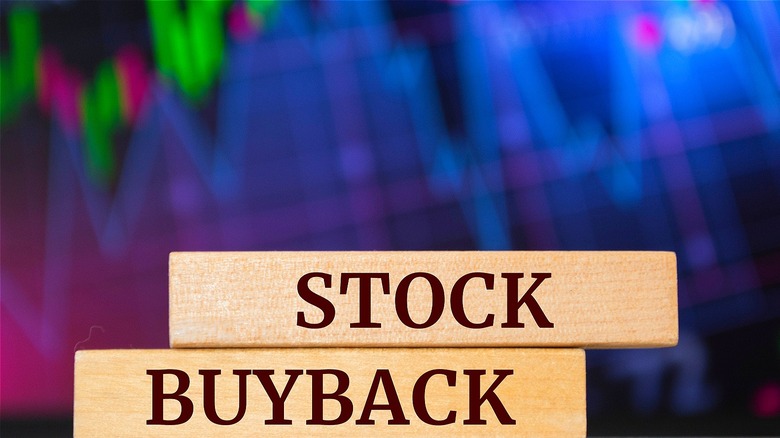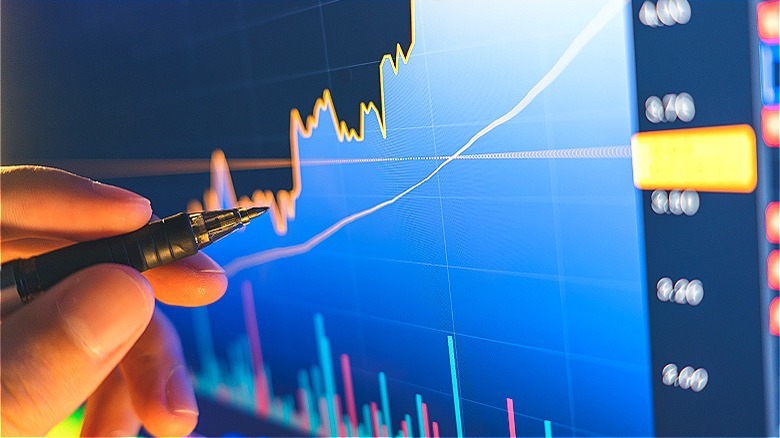What Is A Stock Buyback?
Any investor who's ever purchased a share of stock has hopes that it will rise in value, delivering a juicy capital gain on that investment. However, profitable companies sometimes reward investors in other ways besides generating impressive stock performance. One of those ways is paying dividends, which are periodic earnings payments that a company makes to its shareholders. However, a lesser known perk to investors is when a company conducts a stock buyback, sometimes referred to as a share repurchase program.
Like the name implies, a stock buyback involves a publicly traded company buying back its own stock on the open market, presumably using excess capital that's not needed for operating costs or other investments, like an expansion or new equipment. Typically, companies that decide on a stock buyback will telegraph the move by announcing a "repurchase authorization" from the company's board of directors, accompanied by the amount of stock to be repurchased. That buyback figure can be expressed as a dollar amount, number of shares, or a percentage of the total outstanding shares.
During the buyback, shareholders are under no obligation to sell their shares if they don't wish to. The company will simply purchase shares on the open market at ambient price levels as they become available, until the stock buyback is complete. A stock buyback can also be preferable to a dividend for shareholders because the funds from a dividend are taxable immediately (unless in a retirement account) like income, whereas the share appreciation can be a long-term capital gain.
Why is a stock buyback good for shareholders?
When investors learn a company they own is doing a buyback, the announcement is music to their ears. That's because a buyback typically triggers a spike in the price of that stock. The primary reason is that whenever demand increases, so does price. During a buyback, a company is singlehandedly increasing demand and driving up share price.
While the relationship of supply and demand to price is simple, doing a stock buyback affects the valuation of a company in other ways that are perhaps less obvious. That's because once the shares are bought back, they're either canceled or held internally as "treasury shares." In either case, that reduces the overall number of publicly traded shares of the company, which is the basis for such calculations as earnings per share (EPS) or price-to-earnings ratio (P/E).
For example, if a company has a net income of $100,000 and 2,500 shares of stock outstanding, the EPS will be $4. Following a buyback of 500 shares, that same $100,000 net income divided by 2,000 shares equals an EPS of $5. Reducing the number of outstanding shares gives the appearance that a company is performing better. Yet, the opposite is true for the P/E ratio, one of the most commonly used tools to determine if a stock is priced fairly. In theory, the P/E ratio can fall and signal a price bargain, but this is typically short-lived as the share prices rise post-buyback.
Potential downsides do exist with stock buybacks
So far, we've discussed stock buybacks as a positive event for shareholders' equity and indeed, it typically is. However, there are some rare exceptions where a stock buyback strategy can backfire. For instance, it could be interpreted as an act of desperation or a last resort, signaling the company has exhausted its other investment avenues or growth opportunities, so it's buying its own stock.
Another caveat is that a buyback can be used to cover up stock-based compensation to company management by removing shares from the market at the same time they're being awarded to C-suite executives, blurring the true number of outstanding shares. Also, management that was previously compensated with stock or stock options may see a large gain in share value post-buyback, right alongside the smaller individual investors.
Some analysts are critical of stock buybacks in any capacity, quipping that funds would be better spent growing the business, such as for research and development, new facilities and equipment, or paying down debt. Also, are the shares being purchased by the company at an attractive price, or is the stock already trading at all-time highs? These are all things to consider; however, if a company still has leftover cash after investing in other operations, why not reward shareholders?
If you're wondering what kind of dollar values we're talking about, some of the biggest recent stock buybacks include Apple (AAPL) purchasing $21.3 billion of its own stock during the third quarter of 2023, while Alphabet (GOOG) bought $15.8 billion worth during the same period.


